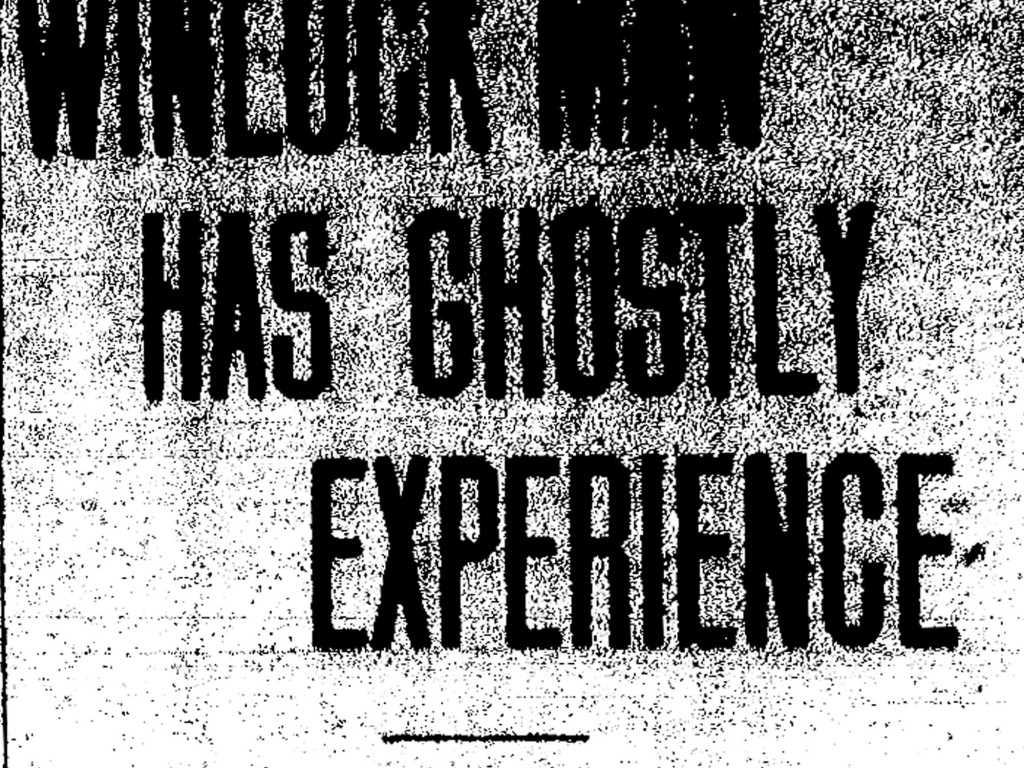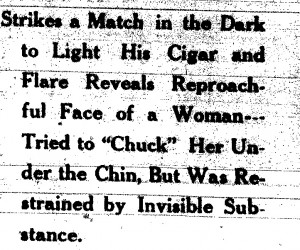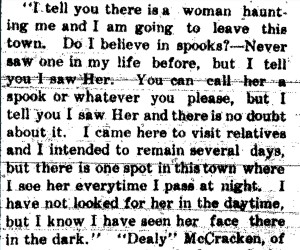From the desk of Steve Willis, Central Library Services Program Manager of the Washington State Library:
The random news for this installment was discovered in The Daily Hub (Centralia, Wash.), February 26, 1916. The following ghost story was top of the fold front page news:
CENTRALIA HAS VERY GENUINE HA’NTED HOUSE
Ghostly Manifestations Defy Solution In Spite of Family’s Best Efforts– Spirit Is Apparently Friendly
Centralia has a haunted house.
This piece of news may be a bit startling to those who always connect haunted houses with old, old mansions with a past of bloody deeds to cover, and they naturally inquire where in Centralia can be found a house that answers this description.
The answer is that there is no such house.
Centralia’s haunted house is modern in every respect and is inhabited by as peaceable, sociable and jolly a family as you could ask to meet. Neither are they a family given to becoming frightened at the noise of a mouse scuttling across the pantry floor or a board squeaking as the house sways to the spring winds.
No, the Kaestners are wholesome, sociable, unafraid folks and when they finally, after many manifestations admitted to close friends that certain things were transpiring about their home on Waunch Prairie that could not be accounted for under ordinary rules governing human agency and action, the admission had considerable weight that it held up under searching investigation.
But the strangest part of the “hant” that has taken up abode at the Kaestner residence is that it is a sociable and also liberal ghost. Unlike the ghost of fiction, it does not believe in needlessly scaring people, neither does it believe in taking away– in fact the Kaestner ghost’s actions bear more resemblance to the gyrations indulged in by Santa Claus than to the work of a soul-terrifying spirit.
Now to get to the real story:
About a week ago Mrs. Kaestner went home after a shopping trip down town, unlocked the door and went in. The cheerful singing of a tea kettle attracted her to the kitchen where she found a merry fire burning in the range– and not a soul on the place. Later, when the family assembled for supper she mentioned the occurrence, but each member of the family stoutly denied having started the range fire. This passed without comment, but next day Fred Kaestner took a heavy room rug out on the lawn to clean for his mother. He left it out to air while he did some chores and when he later folded it up to take in, there underneath the rug was a bright new one dollar currency note. This was talked over and it was finally decided that the bill had been dropped by some passer and not noticed when the rug was thrown out on the lawn for cleaning.
The next visitation of this philanthropic ghost came the next evening. Mrs. Kaestner had gathered the eggs and left them on the screened back porch. Going out shortly after to get some eggs for supper she found, lying on top of the egg basket a nicely folded absolutely new and unwrinkled necktie that had every appearance of having come direct from some good store.
Things began to look decidedly queer by this time and when the next afternoon the phonograph in the front room started to play with all of the family either out or in another part of the house, Mrs. Kaestner was forced to admit that she was becoming nervous to say the least. This action of the phonograph, however, seemed to have appeared to the friendly ghost as a bit out of its line, for the very next day while Mrs. Kaestner was sweeping the back walk she spied in the grass close to the walk a new $2 currency note.
As has been intimated and as everyone knows who has the pleasure of their acquaintance, the Kaestners are not people to become stampeded into accepting any ghost stories or fooled by some easily explained prank, but, in spite of a careful investigation, watching and search they have been unable to explain the series of happenings related.
In the meantime Mr. Kaestner has taken the bills to the bank and found that they are absolutely good, so he is patiently and hopefully awaiting the next visitation.
Max (1851-1909) and Anna Kaestner (1862-1948) with their young son Frederick Frank “Fritz” Kaestner (1881-1947) came to the United States from their native Germany in 1887. Max had been a lieutenant of artillery in the German army. Initially they moved to Colorado but in 1889 set up home in Centralia, Washington. In a short time the Kaestner family had a reputation as running one of the most sanitary and progressive dairies in the area.
When Max died at age 58, several years before the above story took place, he had become very well known in Centralia. One obituary stated, “Mr. Kaestner was a man of sterling character, a man who held strong opinions, and was probably one of the most highly educated men in the county having received the best instruction obtainable in Germany.”
Fritz Kaestner continued to run the dairy for a few decades. If there was a follow-up story about who was jerking this family’s chain in 1916, I’d love to see it.









